2300
Top 10 facts about the Chinese Internet
We at UC Browser is closely related to the Chinese Internet audience. Compare it with the Russian and discuss differences with colleagues working on the Chinese market. In this article, we gathered the basic facts about the Chinese Internet users, trends and compared the Chinese users with the Russian. At the end of the article response to previous questions from readers.
1. In the Internet often come with mobile phones than PCs
In China, mobile Internet has won usual: in 2014 from the phone to the Internet in 83, 4% of users with a PC - 80, 9%. In Russia, only 68% of users at least once a month Internet access on phones and tablets. Average Internet users in China 25 years in Russia - '34 1 sup>.
We compare the behavior of Russian and Chinese mobile Internet users 2 sup>:
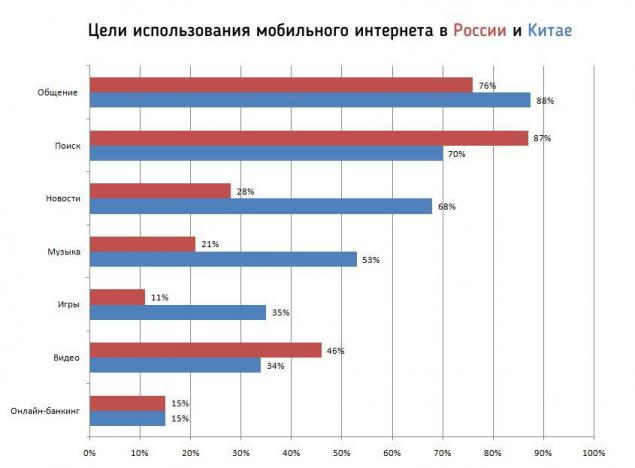
Due to the large number of young users in China, the main traffic accounts for messengers, games, blogs, websites and applications with the music.
2. Mobile sites in priority
Fashion for adaptive sites surpassed China side. Often sites are built only for smartphones, bypassing the PC version, or create different sites for different devices. Whatever the site, it is important that it is displayed correctly in browsers embedded applications 3 sup>.
Recently gaining popularity in China Mobile Landing on HTML5 (轻 应用, qīng yìngyòng or "light apps"). They are often animated and adapted only for touchscreens - navigation requires scrolling manually. These are usually one-off and Landing sharpened by one idea - to talk about the event, promotion, convey specific information.

Shop at the event offers choose a character and pick up clothes.
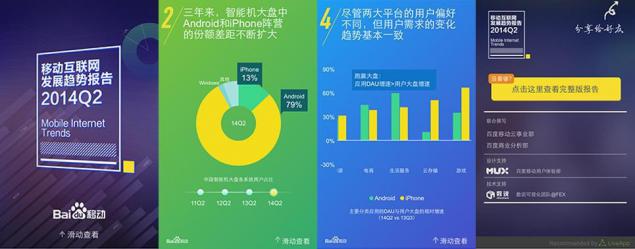
Report company Baidu on trends in the mobile Internet in the second quarter 2014.
3. Mobile browsers - other statistics
Users in China attract additional features. Every major application seeks to expand the functions and application to become "all-in-one." In the case of browsers is a collection of thematic resources (closely connected with the love of links), vital QR-code scanners, file manager, themes and wallpapers.
UC Browser also follows this trend. This made it possible to gain the trust of users in China, according to StatCounter, we occupy the first place among independent mobile browsers and closely competes with the standard Android-browser.
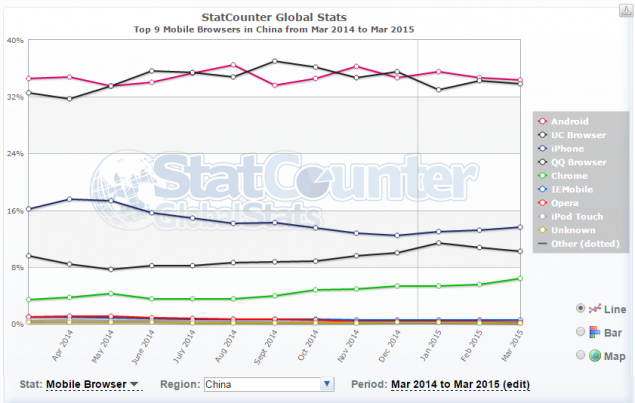
The statistics include QQ Browser and Chrome. QQ Browser - it's part of a larger network of services Tencent QQ, which also includes instant messenger, online games, shopping, microblogging and music services. Therefore, the proportion of QQ Browser is quite large.
Chrome, like Google, has not won a large number of users. The main reason for censorship blocking Google-services in China. This will be discussed further.
4. WeChat and Sina Weibo - the main social networks
The peak of popularity QQ messenger and Facebook clones like RenRen passed. Now in China, there are two leading applications for mobile users 4 sup>: WeChat (600 million registered users) Sina Weibo (556 million users). The function of Sina Weibo is clear: the same Twitter, only in Chinese. Users read news, share information, talk about themselves.
WeChat - is more than a messenger. First of all, the Chinese are a lot of strange voice messages (90% of users to send voice messages, 96% - text). It is easier to say than to write. In most cases, China looks like a normal keyboard with English layout - user is typing Pinyin transliteration system and choose the appropriate Chinese-sounding words. This takes time. So when you want to send a long text, users prefer to send voice messages.
There are a messenger and its social network - "Moments", which can be seen updates and photos of friends. WeChat - a powerful marketing tool for companies: each brand has a public page to which you can subscribe. Through the messenger also scan QR-code, check the balance on the credit card and write in support, pay for goods or services, find people nearby.
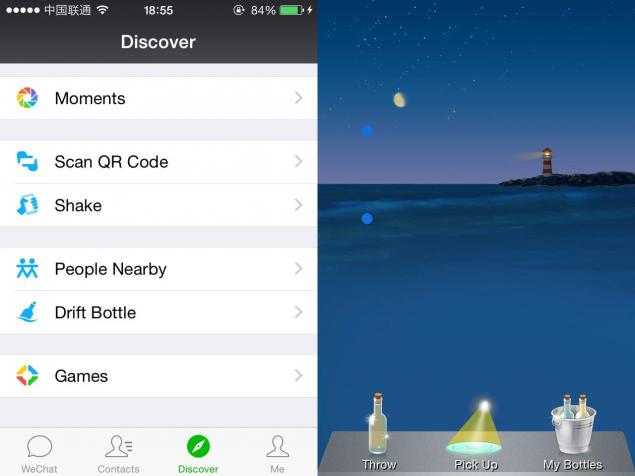
Feature «Drift Bottle» lets you send and receive anonymous messages in the "bottle i>».
5. QR codes everywhere
QR-codes in China encrypt links to sites and applications, business cards messengers, discounts on products, even electronic purses for the rapid design applications.
Earlier this year, the company Alibaba invested in Israeli start-Visualead, engaged in the development of color and animated QR-codes to use them in their own products. The popularity of QR-codes in China have not yet reached the limit.
So, instead, to pay in cash or store card users WeChat offer to scan QR-code, and confirm the operation. MESSENGER will write off the money from the bank card attached. Likewise, you can pay through Alipay, a payment system from Alibaba.
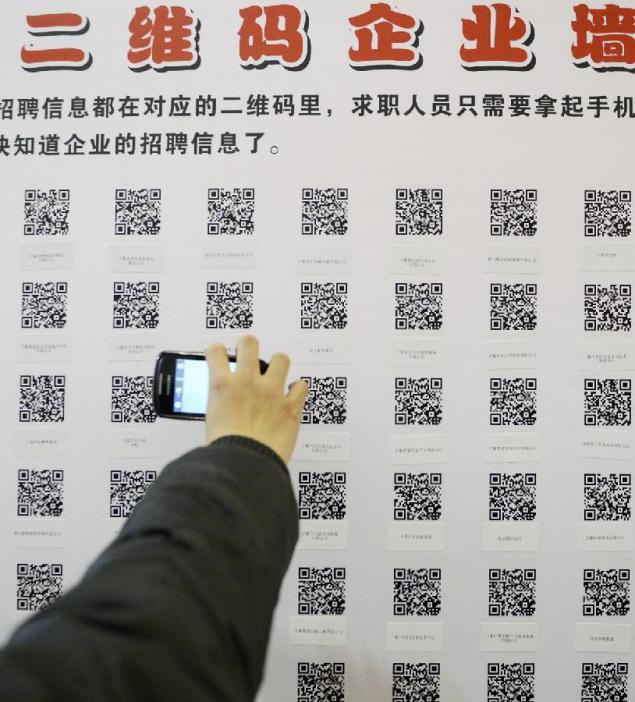
Wall with offers of work at a job fair in Yinchuan, 2013. Applicants scan QR-code, read the position description and the phone is sent separately.
6. Domains sites write numerals
In the Chinese Internet, in addition to the Latin alphabet, domains are often written in figures: for example, 3.cn (online store Jingdong Mall, the second most popular after Taobao), 10010.com (mobile and Internet provider China Unicom) and 163.com (postal service ). Three reasons for this.
Firstly, not all Chinese users accustomed to the Latin alphabet, so dial, much less remember domain in English, can be difficult. The figures are all known and used since childhood. In addition, some Chinese words in tune with the figures, and some figures have mystical significance - I'm sure many will remember stories about the absence of the fourth floor of a building and an elevator (figure 4 is consonant with the word "death").
It turns out that the Chinese company Alibaba website located at 1688.com: address is read as "Yī, liù, bā, bā", and the number 8 means "to get rich."
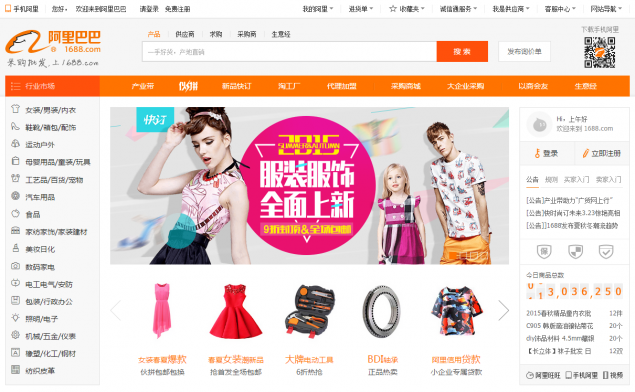
Site Alibaba, address 1688.com - under the logo.
7. dress to stand out. For yourself - download for free
According to мнению users Quora, the Chinese tend to buy things status - those that are visible to the public and emphasize the uniqueness of the owner: fashion accessories, jewelry, gadgets. For personal use goods (washing machines, refrigerators, etc.), by contrast, are reluctant to pay and choose the cheapest.
The same trend can also be seen on the Internet. Hardly Chinese buy games, software, movies and music, if it can be downloaded free of charge - in China is still open, many pirated resources and alternative shops with applications. Therefore, developers entice users free-to-play games, and earn on domestic purchases. Chinese players more than others like to buy virtual goods that can boast in public (clothes for game characters, different types of weapons).
Its approach to monetization found in a musical environment. Pay ringtones and tracks instead of beeps profitable because people are too isolated from the rest. Applications with music offer users listen to songs for free. To download tracks and listen to them on other devices, it is necessary to issue a premium membership.

Screenshot music app Xiami from Alibaba
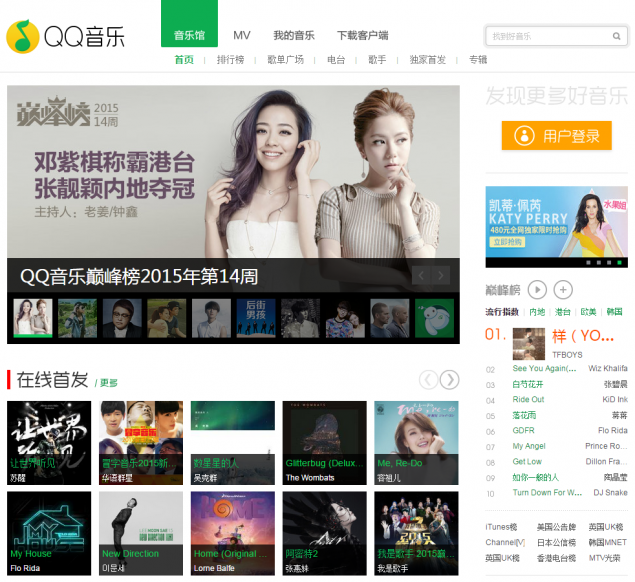
Screenshot website QQ Music
8. Pages overloaded with information
Just go to any Chinese website to see how much the Chinese web design differs from Western. Because capacitance characters long phrases fit into several characters. Blocks with a lot of information, and it seems to us that the sites are full text - is often the way it is.
The habit of creating information overload sites comes from the days when the internet was expensive and slow, and on the same page trying to fit as much information. Internet access prices have fallen, but the habit remained.
At design influences and poor perception of the Latin alphabet. Users simply click on the link ready, you can use the search engine. To find information, users have to deal with pinyin keyboard, and it is difficult for the older generation. Therefore, the sites of habit create rich information. However, in China come to the sleek design - just slower.
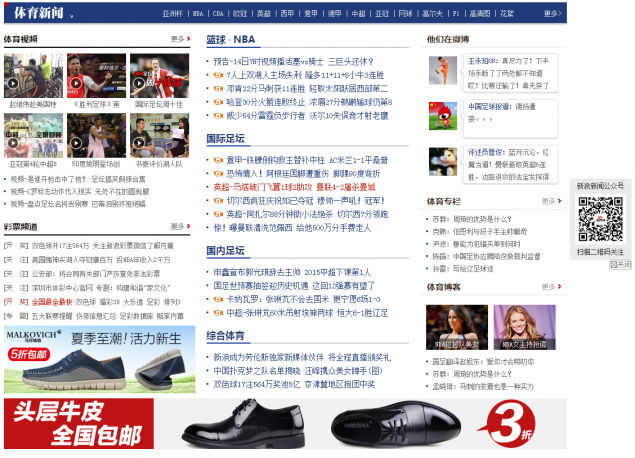
Chinese news website Sina

Russian news website RIA Novosti
9. All information is checked, inappropriate - block
Speaking of the Chinese Internet, not to mention censorship. "Great Chinese Firewall", also known as "Golden Shield", is successful in blocking the main western sites: all the services Google, Facebook, Twitter, Youtube, Blogger, Wordpress, news and other resources. After the "revolution yellow umbrella" in Hong Kong and blocked Instagram. Intermittent work messengers Viber and KakaoTalk, Line blocked. To use the service in China needs VPN. The list of blocked sites can be found here .
The ban on the popular foreign sites has led to the development of local services: Baidu instead of Google, Sina Weibo instead of Twitter, WeChat instead of WhatsApp.
Censorship is not limited to blocking the western sites. Scrutiny and subjected to all Chinese websites. That's what happens when you try to find information about the events at Tiananmen Square in the Chinese search service Baidu:
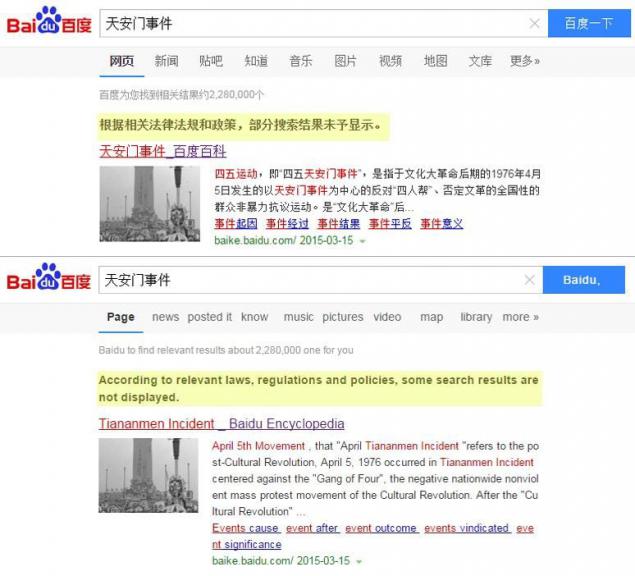
10. High speed Internet access - 3, 4 MB / s
The highest average speed in China - in Shanghai: 5, 4 MB / s 5 sup>. On the one billion people in China only three mobile and ISP: China Telecom, China Unicom and China Mobile. Internet made to pay once in six months or a year. The tariff rate of 12 MB / s will cost around 1,900 yuan per year (about 16 000).
It is worth noting that with the stated speed will be loaded in the main Chinese websites on foreign websites is much lower speed.

Testing internet speed Russian service.
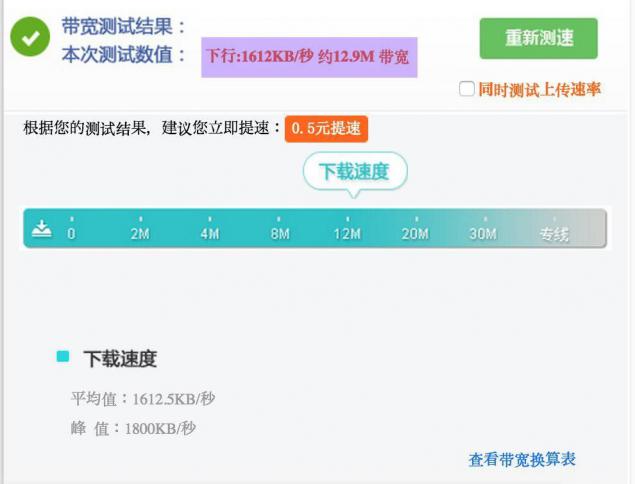
Testing the same connection Chinese service.
In Russia, to use the Internet is cheaper and nicer: According to Yandex, the average speed of the Internet - 9 MB / s, and the monthly fee - 344 rubles a month.
Bonus. For registration site requires a special license
Now, to answer users' questions. In a previous article we have been asked to speak about the process of registration and certificates of site.
In short, to buy Chinese hosting, register a .cn site and carry out activities on the Internet, is required to issue a license the content provider (ICP). The applicant has an identity card, a statement and a certificate of registration of a company in the hosting service. Then hoster sends a request to the Ministry of Industry and Information Technology of China (工 信 部). License is made for 10-20 days.
As rightly noted in the comments, our company has four licenses: 粤 网 文 [2013] 0245-095 号, (粤) - 非 经营 性 -2011-0120, 粤 B2-20070379, 粤 ICP 备 09210879 号.

粤 网 文 [2013] 0245-095 号 - a license to carry out cultural activities on the Internet (网络 文化 经营 许可证, Internet culture operation license). Her issue, if capital is not less than 1 million yuan.
非 经营 性 -2011-0120 - This license confirms that the company is not engaged in e-commerce. The license is not related to medicine, as suggested in the comments on the previous article.
粤 B2-20070379 - license allows users to send SMS.
粤 ICP 备 09210879 号 - the very ICP-license, which is issued by Ministry of Industry and Information Technology of the People's Republic of China for doing business on the Internet.
To summarize. Chinese Internet - identity. Because of the strict regulation of the Government of the Internet are popular only local services. At the same time, well-developed online shopping and online payments: Many prefer to shop on Taobao and pay through Alipay.
Chinese Internet users are almost 10 years younger than the Russian, and most of the time they spend on the Internet for communication and entertainment - music, video, games. Here, as in Russia, a lot of illegal content. In recent years, applications and websites trying to convert users to paid subscription, but victory over the illegal legal content is still far.
Thank you! B>
1 sup> According
thenextweb.com/asia/2014/07/21/in-china-more-people-now-access-the-internet-from-a-mobile-device-than-a-pc
company.yandex.ru/researches/reports/2015/ya_internet_regions_2015.xml#2
www.linkedin.com/pulse/20121002150727-416648-the-chinese-user-is-more-like-you-than-you-think?trk=mp-details-rr-rmpost
product-test.ru/news/intierniet-auditoriiavrossiiznachitielnovyroslav2013ghodu
2 sup> 2013 and 2014. According
corp.mail.ru/media/files/40314-researchmobilemail.pdf and
www.nanjingmarketinggroup.com/blog/chinese-internet-users/how-mobile-internet-use-china-changing
3 sup> www.smashingmagazine.com/2015/02/13/china-web-design-trends-2015
4 sup> wearesocial.net/blog/2014/01/social-digital-mobile-worldwide-2014
5 sup> de.slideshare.net/digitalinsurance/we-are-social-guide-to-social-digital-and-mobile-in-china-2014
Source: geektimes.ru/company/ucbrowser/blog/248948/
1. In the Internet often come with mobile phones than PCs
In China, mobile Internet has won usual: in 2014 from the phone to the Internet in 83, 4% of users with a PC - 80, 9%. In Russia, only 68% of users at least once a month Internet access on phones and tablets. Average Internet users in China 25 years in Russia - '34 1 sup>.
We compare the behavior of Russian and Chinese mobile Internet users 2 sup>:

Due to the large number of young users in China, the main traffic accounts for messengers, games, blogs, websites and applications with the music.
2. Mobile sites in priority
Fashion for adaptive sites surpassed China side. Often sites are built only for smartphones, bypassing the PC version, or create different sites for different devices. Whatever the site, it is important that it is displayed correctly in browsers embedded applications 3 sup>.
Recently gaining popularity in China Mobile Landing on HTML5 (轻 应用, qīng yìngyòng or "light apps"). They are often animated and adapted only for touchscreens - navigation requires scrolling manually. These are usually one-off and Landing sharpened by one idea - to talk about the event, promotion, convey specific information.

Shop at the event offers choose a character and pick up clothes.

Report company Baidu on trends in the mobile Internet in the second quarter 2014.
3. Mobile browsers - other statistics
Users in China attract additional features. Every major application seeks to expand the functions and application to become "all-in-one." In the case of browsers is a collection of thematic resources (closely connected with the love of links), vital QR-code scanners, file manager, themes and wallpapers.
UC Browser also follows this trend. This made it possible to gain the trust of users in China, according to StatCounter, we occupy the first place among independent mobile browsers and closely competes with the standard Android-browser.

The statistics include QQ Browser and Chrome. QQ Browser - it's part of a larger network of services Tencent QQ, which also includes instant messenger, online games, shopping, microblogging and music services. Therefore, the proportion of QQ Browser is quite large.
Chrome, like Google, has not won a large number of users. The main reason for censorship blocking Google-services in China. This will be discussed further.
4. WeChat and Sina Weibo - the main social networks
The peak of popularity QQ messenger and Facebook clones like RenRen passed. Now in China, there are two leading applications for mobile users 4 sup>: WeChat (600 million registered users) Sina Weibo (556 million users). The function of Sina Weibo is clear: the same Twitter, only in Chinese. Users read news, share information, talk about themselves.
WeChat - is more than a messenger. First of all, the Chinese are a lot of strange voice messages (90% of users to send voice messages, 96% - text). It is easier to say than to write. In most cases, China looks like a normal keyboard with English layout - user is typing Pinyin transliteration system and choose the appropriate Chinese-sounding words. This takes time. So when you want to send a long text, users prefer to send voice messages.
There are a messenger and its social network - "Moments", which can be seen updates and photos of friends. WeChat - a powerful marketing tool for companies: each brand has a public page to which you can subscribe. Through the messenger also scan QR-code, check the balance on the credit card and write in support, pay for goods or services, find people nearby.

Feature «Drift Bottle» lets you send and receive anonymous messages in the "bottle i>».
5. QR codes everywhere
QR-codes in China encrypt links to sites and applications, business cards messengers, discounts on products, even electronic purses for the rapid design applications.
Earlier this year, the company Alibaba invested in Israeli start-Visualead, engaged in the development of color and animated QR-codes to use them in their own products. The popularity of QR-codes in China have not yet reached the limit.
So, instead, to pay in cash or store card users WeChat offer to scan QR-code, and confirm the operation. MESSENGER will write off the money from the bank card attached. Likewise, you can pay through Alipay, a payment system from Alibaba.

Wall with offers of work at a job fair in Yinchuan, 2013. Applicants scan QR-code, read the position description and the phone is sent separately.
6. Domains sites write numerals
In the Chinese Internet, in addition to the Latin alphabet, domains are often written in figures: for example, 3.cn (online store Jingdong Mall, the second most popular after Taobao), 10010.com (mobile and Internet provider China Unicom) and 163.com (postal service ). Three reasons for this.
Firstly, not all Chinese users accustomed to the Latin alphabet, so dial, much less remember domain in English, can be difficult. The figures are all known and used since childhood. In addition, some Chinese words in tune with the figures, and some figures have mystical significance - I'm sure many will remember stories about the absence of the fourth floor of a building and an elevator (figure 4 is consonant with the word "death").
It turns out that the Chinese company Alibaba website located at 1688.com: address is read as "Yī, liù, bā, bā", and the number 8 means "to get rich."

Site Alibaba, address 1688.com - under the logo.
7. dress to stand out. For yourself - download for free
According to мнению users Quora, the Chinese tend to buy things status - those that are visible to the public and emphasize the uniqueness of the owner: fashion accessories, jewelry, gadgets. For personal use goods (washing machines, refrigerators, etc.), by contrast, are reluctant to pay and choose the cheapest.
The same trend can also be seen on the Internet. Hardly Chinese buy games, software, movies and music, if it can be downloaded free of charge - in China is still open, many pirated resources and alternative shops with applications. Therefore, developers entice users free-to-play games, and earn on domestic purchases. Chinese players more than others like to buy virtual goods that can boast in public (clothes for game characters, different types of weapons).
Its approach to monetization found in a musical environment. Pay ringtones and tracks instead of beeps profitable because people are too isolated from the rest. Applications with music offer users listen to songs for free. To download tracks and listen to them on other devices, it is necessary to issue a premium membership.

Screenshot music app Xiami from Alibaba

Screenshot website QQ Music
8. Pages overloaded with information
Just go to any Chinese website to see how much the Chinese web design differs from Western. Because capacitance characters long phrases fit into several characters. Blocks with a lot of information, and it seems to us that the sites are full text - is often the way it is.
The habit of creating information overload sites comes from the days when the internet was expensive and slow, and on the same page trying to fit as much information. Internet access prices have fallen, but the habit remained.
At design influences and poor perception of the Latin alphabet. Users simply click on the link ready, you can use the search engine. To find information, users have to deal with pinyin keyboard, and it is difficult for the older generation. Therefore, the sites of habit create rich information. However, in China come to the sleek design - just slower.

Chinese news website Sina

Russian news website RIA Novosti
9. All information is checked, inappropriate - block
Speaking of the Chinese Internet, not to mention censorship. "Great Chinese Firewall", also known as "Golden Shield", is successful in blocking the main western sites: all the services Google, Facebook, Twitter, Youtube, Blogger, Wordpress, news and other resources. After the "revolution yellow umbrella" in Hong Kong and blocked Instagram. Intermittent work messengers Viber and KakaoTalk, Line blocked. To use the service in China needs VPN. The list of blocked sites can be found here .
The ban on the popular foreign sites has led to the development of local services: Baidu instead of Google, Sina Weibo instead of Twitter, WeChat instead of WhatsApp.
Censorship is not limited to blocking the western sites. Scrutiny and subjected to all Chinese websites. That's what happens when you try to find information about the events at Tiananmen Square in the Chinese search service Baidu:

10. High speed Internet access - 3, 4 MB / s
The highest average speed in China - in Shanghai: 5, 4 MB / s 5 sup>. On the one billion people in China only three mobile and ISP: China Telecom, China Unicom and China Mobile. Internet made to pay once in six months or a year. The tariff rate of 12 MB / s will cost around 1,900 yuan per year (about 16 000).
It is worth noting that with the stated speed will be loaded in the main Chinese websites on foreign websites is much lower speed.

Testing internet speed Russian service.

Testing the same connection Chinese service.
In Russia, to use the Internet is cheaper and nicer: According to Yandex, the average speed of the Internet - 9 MB / s, and the monthly fee - 344 rubles a month.
Bonus. For registration site requires a special license
Now, to answer users' questions. In a previous article we have been asked to speak about the process of registration and certificates of site.
In short, to buy Chinese hosting, register a .cn site and carry out activities on the Internet, is required to issue a license the content provider (ICP). The applicant has an identity card, a statement and a certificate of registration of a company in the hosting service. Then hoster sends a request to the Ministry of Industry and Information Technology of China (工 信 部). License is made for 10-20 days.
As rightly noted in the comments, our company has four licenses: 粤 网 文 [2013] 0245-095 号, (粤) - 非 经营 性 -2011-0120, 粤 B2-20070379, 粤 ICP 备 09210879 号.

粤 网 文 [2013] 0245-095 号 - a license to carry out cultural activities on the Internet (网络 文化 经营 许可证, Internet culture operation license). Her issue, if capital is not less than 1 million yuan.
非 经营 性 -2011-0120 - This license confirms that the company is not engaged in e-commerce. The license is not related to medicine, as suggested in the comments on the previous article.
粤 B2-20070379 - license allows users to send SMS.
粤 ICP 备 09210879 号 - the very ICP-license, which is issued by Ministry of Industry and Information Technology of the People's Republic of China for doing business on the Internet.
To summarize. Chinese Internet - identity. Because of the strict regulation of the Government of the Internet are popular only local services. At the same time, well-developed online shopping and online payments: Many prefer to shop on Taobao and pay through Alipay.
Chinese Internet users are almost 10 years younger than the Russian, and most of the time they spend on the Internet for communication and entertainment - music, video, games. Here, as in Russia, a lot of illegal content. In recent years, applications and websites trying to convert users to paid subscription, but victory over the illegal legal content is still far.
Thank you! B>
1 sup> According
thenextweb.com/asia/2014/07/21/in-china-more-people-now-access-the-internet-from-a-mobile-device-than-a-pc
company.yandex.ru/researches/reports/2015/ya_internet_regions_2015.xml#2
www.linkedin.com/pulse/20121002150727-416648-the-chinese-user-is-more-like-you-than-you-think?trk=mp-details-rr-rmpost
product-test.ru/news/intierniet-auditoriiavrossiiznachitielnovyroslav2013ghodu
2 sup> 2013 and 2014. According
corp.mail.ru/media/files/40314-researchmobilemail.pdf and
www.nanjingmarketinggroup.com/blog/chinese-internet-users/how-mobile-internet-use-china-changing
3 sup> www.smashingmagazine.com/2015/02/13/china-web-design-trends-2015
4 sup> wearesocial.net/blog/2014/01/social-digital-mobile-worldwide-2014
5 sup> de.slideshare.net/digitalinsurance/we-are-social-guide-to-social-digital-and-mobile-in-china-2014
Source: geektimes.ru/company/ucbrowser/blog/248948/
In the US plan to build the most powerful supercomputer in the world
The Vatican has entered the market eLearning






















